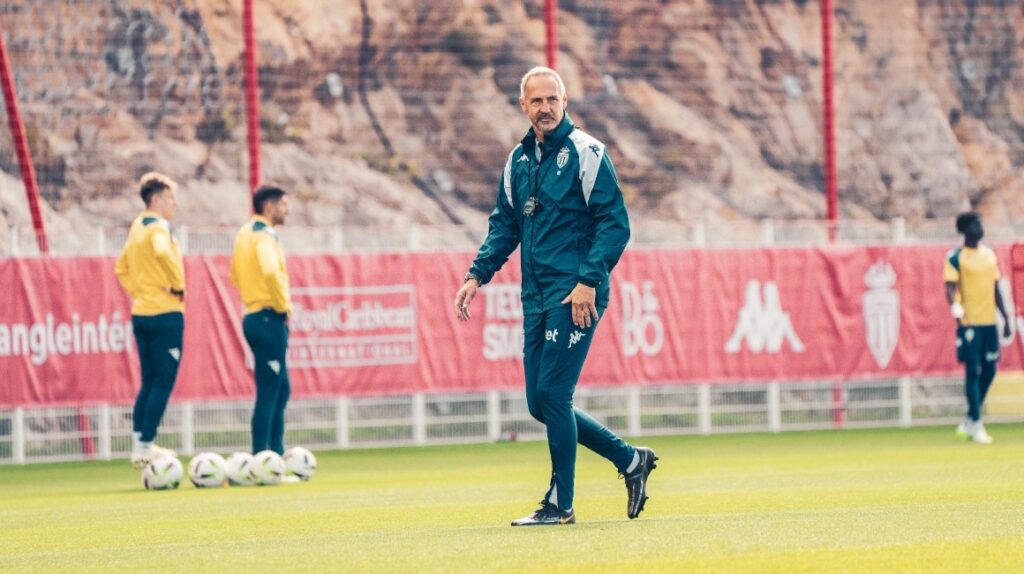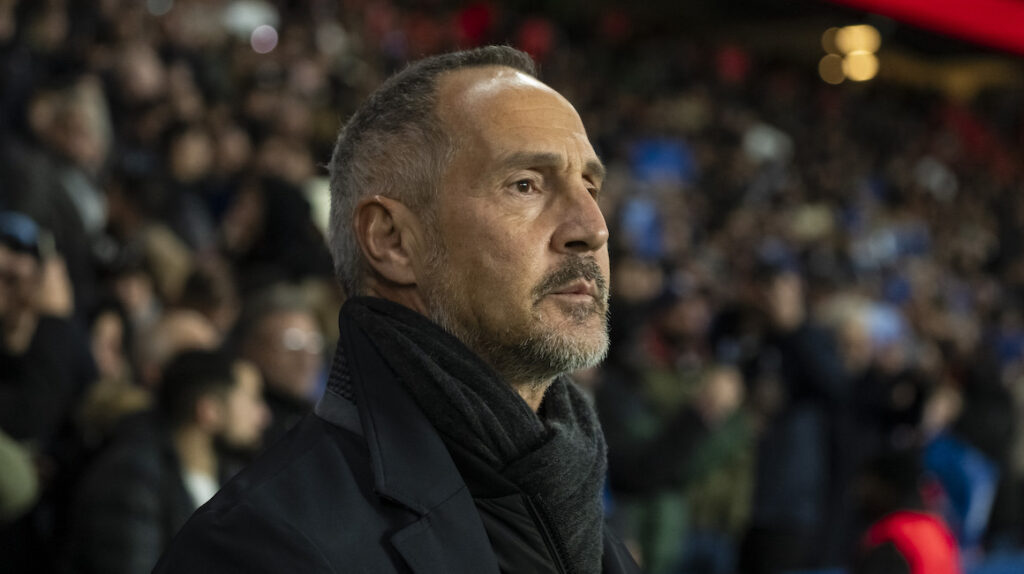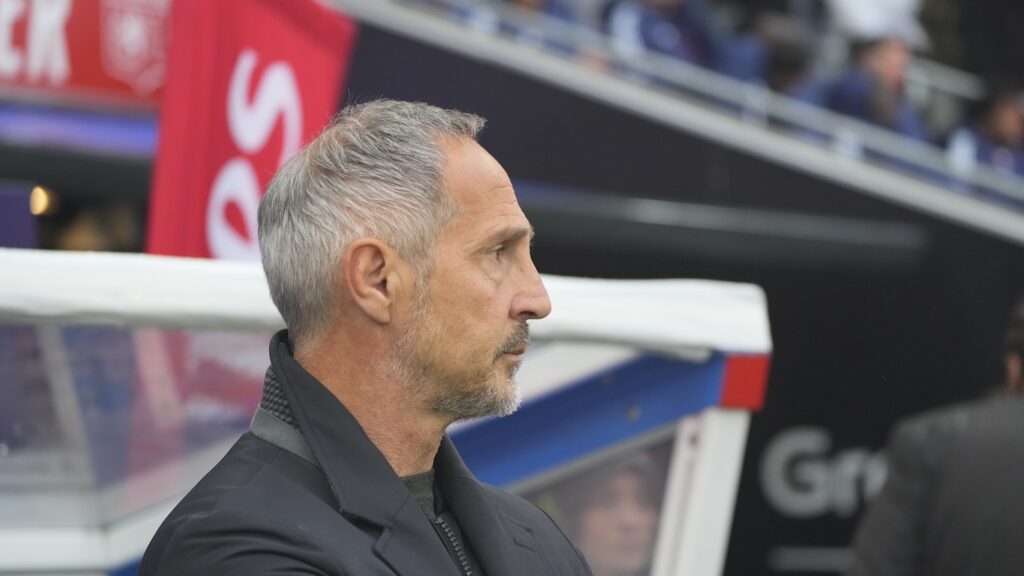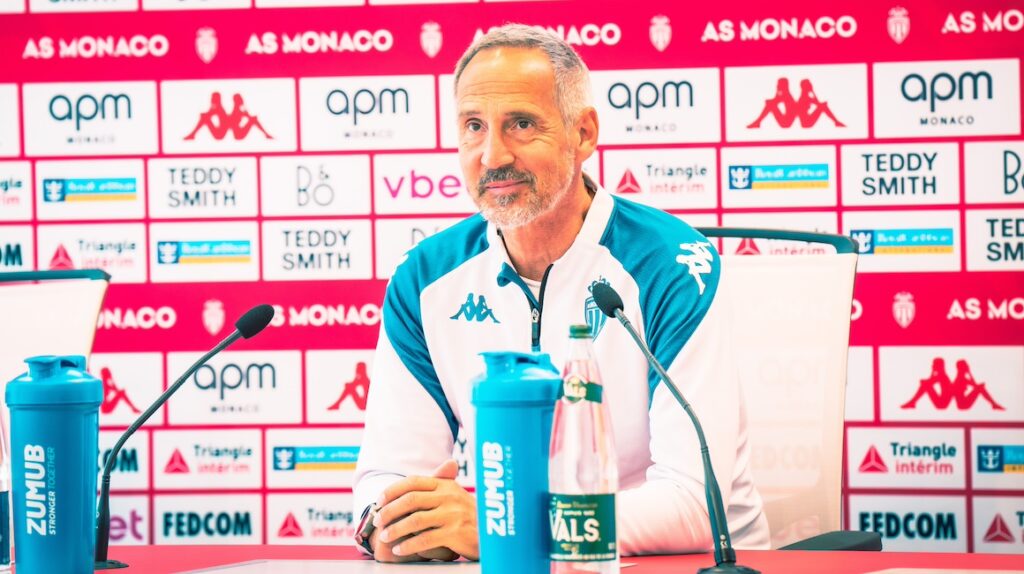Adi Hutter: Everything you need to know about the AS Monaco manager

Doing a tremendous job in his first season at the helm of AS Monaco, Adi Hutter’s managerial expertise has helped propel Les Monegasques firmly in contention for Champions League qualification.
Implementing his philosophy superbly and getting the players swiftly on board, he deserves immense credit for the work he’s done so far. While there’s been some bumps in the road, which is to be expected in any coach’s debut term at a team, his tenure has been overwhelmingly positive as the completion of the crusade approaches.
Looking back on his interesting career, and he’s had a fascinating adventure in the game on his path to building himself as an elite tactician at the highest level.
Having enjoyed a professional playing career that spanned nearly two decades and saw him rack up nearly 500 appearances, where he notably shone during Austria Salzburg’s remarkable run to the 1994 UEFA Cup final that ended in defeat to Inter Milan, and earned 14 international caps for Austria, he immediately turned to coaching upon retiring.
Venture into the coaching world
Beginning his intriguing journey to the top with Red Bull Salzburg as a coach in their junior team to get a foot in the door, he then switched to SCR Altach, which allowed him to start making strides at the senior level in the Austrian second division.
Despite missing out on promotion, there was no doubting his managerial acumen, as he led Altach to a third and a second in the standings while effectively imposing his style.
Hutter then departed for fellow second division out SV Grodig in 2012, which served as another key juncture in establishing himself in the dugout. Securing an incredible promotion to the Austrian top flight with the modest minnows, this achievement was nothing short of remarkable.
Impressively getting Grodig to punch above their weight, it was superb to see Hutter’s physically imposing, determined and relentless team confront the challenge head-on and translate their form into the Austrian Bundesliga.
Unfazed by the step up in class, they took the league by storm by mixing it with the heavy hitters in a season where they ultimately and deservedly earned Europa League playoff qualification by virtue of their third place in the table.
As a result of his exceptional efforts, Red Bull Salzburg sporting director Ralf Rangnick came calling, and Hutter jumped at the chance to join his former club, even though they were named Austria Salzburg when he played for them.
Although Malmo ruined their Champions League qualification hopes, this setback was quickly overcome, for Hutter’s one season in charge was full of positivity.

Not only he did they secure a domestic league and cup double, but his Salzburg also scored 99 Bundesliga goals as part of a hugely exciting team that featured the likes of Sadio Mane, Naby Keita, Konrad Laimer, Marcel Sabitzer, Kevin Kampl, Alan, Johnathan Soriano, Peter Gulacsi, Hwang-Hee-chan and Takumi Minamino.
Witnessing a host of the club’s elite performers being sold off, this wasn’t something Hutter was interested in being around for so he made the decision to part ways following his successful stint.
“I didn’t want to start every new pre-season with so many new players, especially when faced with the really big challenge of trying to qualify for the Champions League. The club and I had different opinions about the team, but we stayed professional and decided to end my contract,” he told The Coaches’ Voice.
Swiss success
Eager for a fresh start, joining Swiss side Young Boys presented him with a fantastic opportunity to stamp his mark abroad.
Immediately noticing the mentality and the approach of the club needed a reset, he rapidly instilled his framework. Doing a sterling job of bridging the gap to serial winners FC Basel, Hutter finally steered Young Boys to the title in his third year after finishing second twice.
Claiming the club’s first league triumph since 1986 while playing an entertaining brand of football, this was a fitting and tangible reward for all his outstanding work awakening the sleeping giants.
Step into Germany
Ready for a new challenge, Eintracht Frankfurt was his next destination, as he took over from Niko Kovac, who had just won the German Cup before joining Bayern Munich.
Getting off to a woeful start to begin the 2018/2019 season by losing the German Super Cup 5-0 to Bayern and being knocked out of the cup at the hands of fourth division team SSV Ulm, things certainly didn’t go to plan initially.
Determined not to let this rocky patch define the campaign, Frankfurt then won 10 of their next 11 Bundesliga and Europa League fixtures to put themselves back on track.

Led by their phenomenal trio of attackers in Luka Jovic, Sebastien Haller and Ante Rebic, Hutter’s offensively-geared formula began to bear fruit, with Frankfurt eventually ending the season in seventh.
Upon parlaying this with him guiding the team to a memorable Europa League semi-final run, which saw them admirably overcome Inter Milan and Benfica before losing to Chelsea in a heartbreaking penalty shootout after drawing both legs, and this punctuated his managerial class.
Awarded with a string of accolades for his incredible body of work that included winning German newspaper Bild and the union of professional footballers coach of the year, while his Eintracht Frankfurt was voted team of the year, this further underlined his touchline heroics.
While the aforementioned triumvirate of stars that combined for 57 goals were all sold at the end of the season, his focus shifted to once again working wonders with the players at his disposal.
Despite bringing in Andre Silva on loan from AC Milan and Bas Dost to spearhead the attack, both accomplished forwards in their own right, it was unsurprising they couldn’t replicate their predecessors’ potency going forward. To the team and Hutter’s credit, though, they still had a solid season, which saw them reach the German Cup semis, the Round of 16 in the Europa League and finish ninth in the Bundesliga.
The subsequent season saw him propel Frankfurt into the fight for Champions League qualification. While they fell just short to bank fifth, much of the chat surrounding his future had begun prior to the completion of the campaign, which, as Hutter admitted, impacted his side’s performance in the final stages.
Agreeing to join Borussia Monchengladbach during the season after weighing up his options, Hutter’s time with Die Fohlen wasn’t all plain sailing, however, for not only was his style not entirely suitable for the personnel available, but sporting director Max Eberl’s departure due to illness also came as a huge blow.
Wrapping up his spell in Gladbach at the end of the term, in a year that was full of ups and downs, the next step for him was to take some time off. “In 14 years as a head coach, I had had only one break: the three months between Salzburg and Bern. You get this tunnel vision,” he reflected.
“After leaving Gladbach, I said to my assistant: ‘We need a break. In the last seven years, we have done 350 games’. When you start, you make many mistakes, but you learn with every single game – and over time the mistakes decrease. You learn being a coach is about more than going on the pitch and running training sessions. You are a communicator, a motivator; you bring your style of football to a team, and for that you need relationships with the players. I am happy with the coach I’ve become. Now I am ready for the next step.”
Having taken charge of almost 600 games in 14 years as a head coach before his sabbatical, his much-needed break allowed him to refresh and recalibrate, as he assessed his options.
Monaco move
The next stop on his managerial journey saw him link up with AS Monaco, and he hasn’t look back since in what’s been an overwhelmingly upside-filled debut season in the Principality, where he’s got his message across coherently to ensure his team are a tactically flexible, organised, dedicated, versatile and attacking outfit.

“I like for my teams to play aggressive football in a good way, to be proactive, with a clear idea of how to play. This must go with the desire to have a conquering state of mind, to show character,” he insisted.
“In the end, it’s me who makes the decisions, but I have to make everyone come together, all of these energies, towards the same objective. I also like to maintain a relationship with my players, to speak with them, because behind everyone there is a human being. So I want to create this link, because in the end it’s the players who are on the pitch, not me. We must therefore do everything to ensure that they are all in the best condition.”
Proving a real force to be reckoned with in Ligue 1, it’ll be expected the experienced, well-travelled tactician, who became only the second Austrian to coach the club after Anton Marek in the 1950s, can keep ASM on their upward trajectory.
Upon his arrival, three of his main objectives were to obtain European qualification, get everyone pulling in the same direction and integrate some of Monaco’s talented youngsters. He’s definitely done the latter two and on the right track to achieve the first aim, with Monaco posing a massive threat to any opponent due to their individual and collective strength.
Striking a good balance both on and off the pitch to build up a strong rapport with the players and vindicating the club’s decision to place their faith in him, all of his, and the team’s, hard work is paying off handsomely.
Securing a coveted Champions League qualification berth would be a fitting reward to close out the campaign in style, which would be a further demonstration of what an astute acquisition the Austrian maestro has been to elevate ASM back to the lofty heights where they belong.








